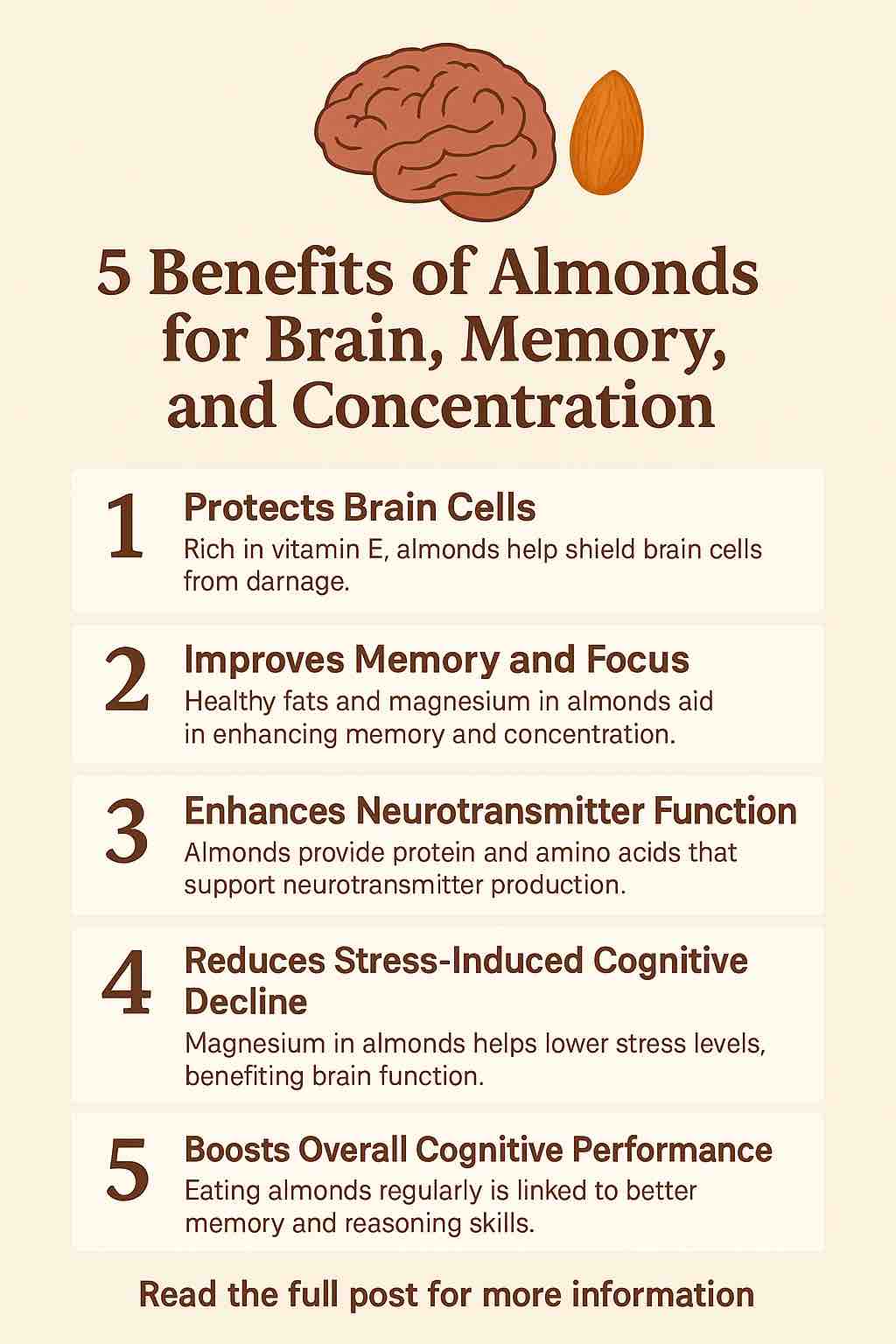
Almonds are among the most nutrient-dense nuts, loaded with essential vitamins, minerals, protein, and healthy fats. Beyond their role in supporting overall health, almonds have been increasingly recognized for their remarkable effects on brain function, memory, and concentration. This essay explores how almonds benefit cognitive health and how to consume them for optimal results.
Nutritional Powerhouse for Brain Health
Almonds are rich in several nutrients that are vital for brain health:
- Vitamin E: A potent antioxidant that protects brain cells from oxidative stress, potentially reducing the risk of cognitive decline, including Alzheimer’s disease and dementia.
- Magnesium: Critical for nervous system regulation, it helps lower stress and anxiety levels, thereby supporting mental clarity and cognitive performance.
- Monounsaturated Fats: These healthy fats support brain cell structure and enhance communication between neurons, leading to better memory and focus.
- Protein and Amino Acids: Essential for the repair of brain tissues and the production of neurotransmitters, which are chemical messengers involved in learning and memory.
- Trace Minerals (Zinc, Iron, Copper): These play important roles in maintaining optimal brain function and neurotransmitter activity.
⚠️ Note: Unlike walnuts or flaxseeds, almonds are not a significant source of omega-3 fatty acids, though their monounsaturated fats still provide brain-boosting benefits.
Five Key Benefits of Almonds for Cognitive Function
- Protects Brain Cells
The vitamin E in almonds combats free radical damage, helping to slow cognitive aging and reduce the risk of degenerative diseases. - Improves Memory and Focus
The combination of healthy fats and magnesium promotes sustained concentration and better retention of information. - Enhances Neurotransmitter Function
Protein and amino acids support the production of neurotransmitters like dopamine and serotonin, essential for learning and emotional regulation. - Reduces Stress-Induced Cognitive Decline
Magnesium helps regulate stress responses, which in turn can improve decision-making and short-term memory under pressure. - Boosts Overall Cognitive Performance
Research suggests that consistent almond consumption is linked to improvements in reasoning, memory, and problem-solving skills.
How to Eat Almonds for Maximum Brain Benefits
To unlock the full potential of almonds, consider the following practices:
- Eat Them Raw
Raw almonds retain their full nutritional profile. Avoid heavily roasted or salted varieties that may contain excess sodium or lose nutrients. - Soak Them Overnight
Soaking helps remove enzyme inhibitors from the skin, improving nutrient absorption and digestion. Peel them in the morning for better taste and digestibility. - Add Them to Your Diet Creatively
Incorporate almonds into oatmeal, salads, yogurt, smoothies, or use them to make almond milk or almond butter. - Pair with Other Brain Foods
Combine almonds with berries, oats, or yogurt to enhance synergistic effects on brain function. - Mind the Portion
Almonds are calorie-dense. About 8–10 soaked almonds or 1 ounce (~23 almonds) per day is a healthy serving.
Types of Almonds Available in India
India offers a variety of almonds, each with unique taste, texture, and nutritional nuances:
| Type | Origin | Characteristics | Nutritional Note |
|---|---|---|---|
| California | USA | Large, mild flavor, widely available | Good all-round option, consistent quality |
| Gurbandi | India (J&K) | Small, dark skin, intense flavor | Higher in antioxidants and vitamin E |
| Mamra | Iran, Afghanistan | Wrinkled, sweet taste, premium variety | Very nutrient-dense, rich in healthy fats |
| Kashmiri | Kashmir Valley, India | Small, reddish skin, slightly bitter taste | Often used in sweets, moderate nutrition |
🧠 Gurbandi and Mamra almonds are considered the most nutrient-dense due to their higher antioxidant content and natural growth without chemical processing.
Conclusion
Almonds are a smart, delicious, and natural way to support brain health, memory, and cognitive function. Packed with brain-nourishing nutrients like vitamin E, magnesium, healthy fats, and protein, they are easy to incorporate into a balanced diet. Whether you choose California for convenience, Gurbandi or Mamra for superior nutrition, or Kashmiri for traditional flavor, almonds make a powerful ally in promoting mental clarity and long-term brain vitality.
So the next time you’re looking for a brain-boosting snack, reach for a handful of almonds—your brain will thank you.
FAQs
- How many almonds should I eat daily for brain benefits?
A daily intake of 8–10 soaked almonds or around 1 ounce (approximately 23 almonds) is ideal for promoting brain health without excess calories. - Should I eat almonds raw or roasted?
Raw or soaked almonds are best, as they retain their full nutrient profile. Avoid roasted or salted varieties due to added sodium and potential nutrient loss. - Why soak almonds before eating?
Soaking almonds overnight removes enzyme inhibitors, making nutrients easier to absorb and improving digestion. - Do almonds really help with memory and concentration?
Yes, almonds are rich in vitamin E, magnesium, and healthy fats, which support memory, focus, and overall cognitive performance. - Are almonds a source of omega-3 fatty acids?
No, almonds are rich in monounsaturated fats, not omega-3s. For omega-3s, consider walnuts, flaxseeds, or chia seeds. - What is the best time to eat almonds for brain health?
Eating almonds in the morning on an empty stomach is ideal to maximize nutrient absorption and sustained energy throughout the day. - Which almond variety is most nutritious?
Gurbandi and Mamra almonds are considered more nutrient-dense than California or Kashmiri almonds due to higher antioxidant and fat content. - Can children eat almonds for brain development?
Yes, almonds are excellent for children’s cognitive development. Just ensure they are soaked and peeled for easier digestion and safety. - Do almonds help reduce stress and anxiety?
Yes, almonds are rich in magnesium, which helps regulate the nervous system and reduce stress levels. - Can I eat almonds if I’m watching my weight?
Absolutely. Almonds are filling and nutrient-dense. Stick to recommended portions to enjoy the benefits without excess calories.









